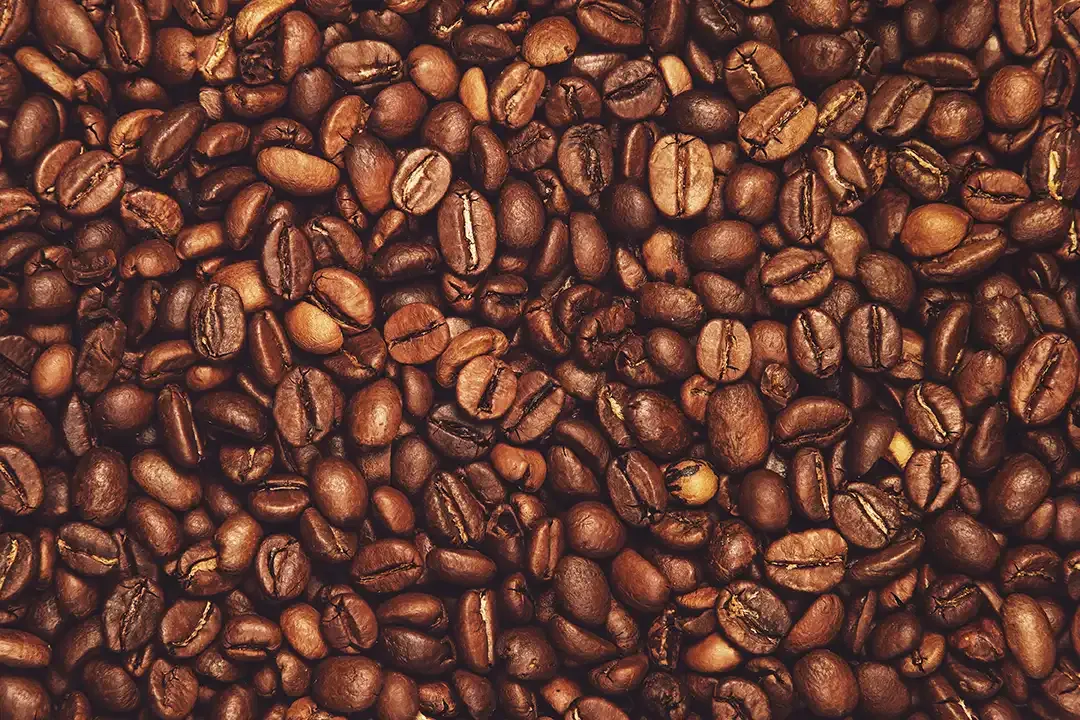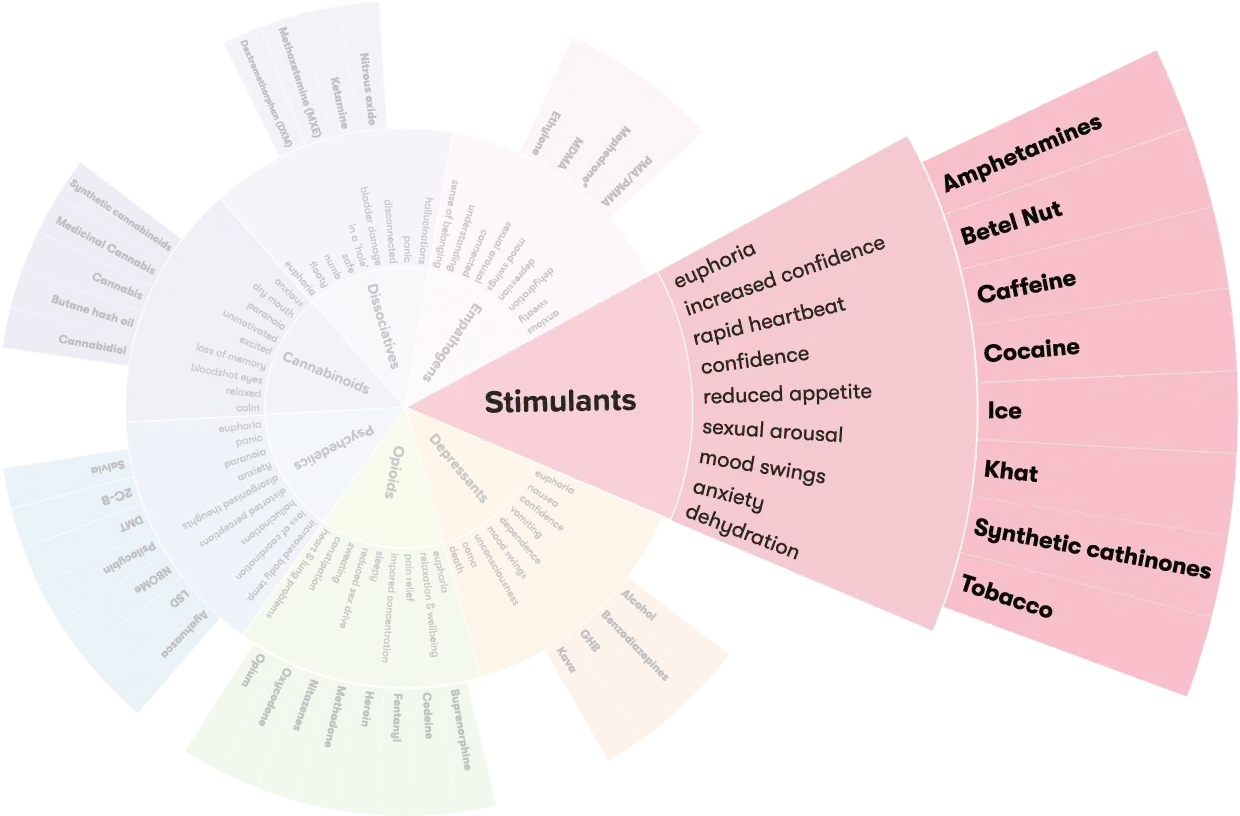How is caffeine used?
Caffeine is used in a number of different products. The amount of caffeine in products can vary dramatically, so it’s always best to check the label. The average amounts are listed below.
Average amounts 3
| Product | Average caffeine content (mg per ml) |
|---|---|
| Espresso | 145 mg caffeine per 50ml cup |
| Caffeinated beverage or energy drink | 80 mg caffeine per 250ml cup |
| Instant coffee (1 teaspoon per cup) | 80 mg caffeine per 250ml cup |
| Black tea | 50 mg caffeine per 220ml cup |
| Cola drinks | 36.4 mg caffeine per 375 ml can |
| Milk chocolate | 10 mg caffeine per 50g bar |
Adapted from Food Standards Australia & New Zealand (2019).
Effects of caffeine
Use of any drug can have risks. It’s important to be careful when taking any type of drug.
Caffeine affects everyone differently, based on:
- size, weight and health
- whether the person is used to taking it
- whether other drugs are taken around the same time
- the amount taken
The following effects may be experienced within 30 minutes after consuming caffeine, and may continue for up to 6 hours:
- feeling more alert and active
- restlessness, excitability and dizziness
- anxiety and irritability
- dehydration and needing to urinate more often
- higher body temperature
- faster breathing and heart rate
- headache and lack of concentration
- stomach pains.4
Children and young people who consume energy drinks containing caffeine may also suffer from sleep problems and anxiety.5-7
Overdose
If a large amount of caffeine is consumed it can also cause an overdose.
Call an ambulance straight away by dialling triple zero (000) if you experience any of the following effects.
- tremors
- nausea and vomiting
- abdominal pain
- diarrhoea
- rapid breathing
- nervousness/anxiety
- irritability/agitation
- very fast and irregular heart rate
- confusion and panic attack
- seizures.5
It is unlikely that a toxic amount of caffeine can be consumed from caffeinated beverages alone.8 However, large doses of caffeine are dangerous and there have been deaths from people consuming caffeine in tablet or powder form.9
People who use caffeinated products, such as weight loss products or powdered caffeine for performance and image enhancing aids, should ensure they are aware of the recommended reasonable amount of caffeine to consume per serving.
Long-term effects
Regular, heavy use of caffeine (such as more than 4 cups of coffee a day) may eventually cause:
- anxiety
- difficulty sleeping
- ulcers
- osteoporosis in post-menopausal women
- irritability and headaches
- dizziness and ringing in the ears
- muscle tremor
- weakness and fatigue
- rapid heart rate and quickened breathing rate
- poor appetite, nausea, vomiting and diarrhoea
- increased thirst, frequent urination or increased urine volume
- irregular heart rate or rhythm
- low blood pressure with faintness or falls
- seizures, confusion or delirium.42
Mixing caffeine with other drugs
Mixing caffeine with other drugs can have unpredictable effects and increase the risk of harm. An average amount of caffeine (such as an espresso) is relatively safe when mixed with other drugs, however some people find the combination of caffeine with stimulant drugs uncomfortable.10 Caffeine and alcohol: can cause strain on the body and mask alcohol’s sedative effects such as falling asleep, leading to drinking more, risk taking behaviour and increased alcohol related harms.2, 11
Reducing harm
There are ways in which you can reduce the risks associated with using caffeine:
- Healthy adults should drink no more than 4 cups of coffee per day.
- Children and young adults should avoid excessive consumption of energy drinks and coffee.
- Pregnant of breastfeeding women should limit their coffee intake to no more than 200 mg per day.
Avoid consuming caffeine and alcohol as the caffeine can mask the effects of the alcohol which can lead to drinking more, taking risks and increased alcohol related harms.
Withdrawal
Giving up caffeine after using it for a long time is challenging because the body has to get used to functioning without it. Withdrawal symptoms usually start within 12-24 hours after the last dose. The symptoms can last for around 2-7 days, or even longer for people who consume a lot.2
These symptoms can include:
- headache
- marked fatigue or drowsiness
- nausea
- anxiety/irritability
- sweating
- dysphoric, depressed mood or irritability
- difficulty concentrating
- flu-like symptoms (nausea, vomiting or muscle pain/stiffness).2
Pure and highly concentrated caffeine food products are prohibited in Australia.3 Since December 2019, the retail sale of foods where caffeine is present in a concentration of 5% or more for foods that are solid or semi-solid, or 1% or more for foods that are liquid, has been prohibited.3
- In Australia between 2004 and 2010, there were 297 calls to the NSW Poisons Information Line concerning toxicity from caffeinated energy drinks. The most commonly reported symptoms included palpitations/tachycardia, tremors, shaking, agitation, restlessness and gastrointestinal upset.11
Consumption
- The average intake of caffeine in Australia is 3mg/kg caffeine per day, or roughly 210mg per 70kg person (equivalent to approximately 2.7 250ml cups of instant coffee or 2.6 standard 250mL energy drinks).10
- Sales of energy drinks in Australia and New Zealand increased from 34.5 million litres in 2001 to 155.6 litres in 2010.10
- Brands B, Sproule B, & Marshman J. Drugs & Drug Abuse. 3rd ed. Ontario: Addiction Research Foundation; 1998.
- Kaye S. Caffeine: What you need to know. National Drug and Alcohol Research Centre; 2014.
- Food Standards Australia & New Zealand. Caffeine: Food Standards Australia & New Zealand; 2019
- Upfal J. The Australian drug guide. 7th ed. Melbourne Black Inc.; 2006.
- Seifert SM, Schaechter JL, Hershorin ER, Lipshultz SE. Health effects of energy drinks on children, adolescents, and young adults. Pediatrics. 2011;127(3):511-28.
- Visram S, Cheetham M, Riby DM, Crossley SJ, Lake AA. Consumption of energy drinks by children and young people: a rapid review examining evidence of physical effects and consumer attitudes. BMJ Open. 2016;6(10):e010380.
- Ruxton CHS. The suitability of caffeinated drinks for children: a systematic review of randomised controlled trials, observational studies and expert panel guidelines. Journal of Human Nutrition and Dietetics. 2014;27(4):342-57.
- Jones AW. Review of Caffeine-Related Fatalities along with Postmortem Blood Concentrations in 51 Poisoning Deaths. Journal of Analytical Toxicology. 2017;41(3):167-72.
- Cappelletti S, Piacentino D, Fineschi V, Frati P, Cipolloni L, Aromatario M. Caffeine-Related Deaths: Manner of Deaths and Categories at Risk. Nutrients. 2018;10(5).
- Tripsit Wiki. Caffeine 2015 [cited: 30.03.2023].
- Lubman D, Peacock A, Droste N, Pennay A, Miller P, Bruno R, et al. Alcohol and Energy Drinks in NSW: Leading responses to alcohol and drug issues. Turning Point Alcohol and Drug Centre, Eastern Health and Monash University, School of Psychology, University of Tasmania, School of Psychology, Deakin University, National Drug and Alcohol Research Centre, Institute of Culture and Society, University of Western Sydney, NSW Poisons Information Centre; 2013.
- Gunja N, Brown JA. Energy drinks: health risks and toxicity. The Medical journal of Australia. 2012;196(1):46-9

